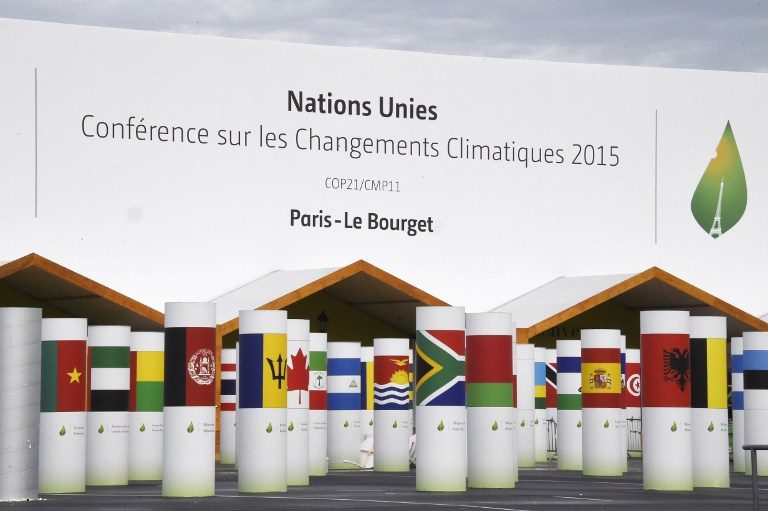SUMMARY
This is AI generated summarization, which may have errors. For context, always refer to the full article.

MANILA, Philippines – Six months after 175 countries signed the Paris Agreement on Climate Change, delegates from these countries will meet once again in Marrakech, Morocco on November 7 to finally put the deal into force. (READ: PH to sit as observer in Morocco climate talks)
This is earlier than expected, after at least 55 countries responsible for 55% of the emissions have already ratified the agreement.
While the Philippine delegation will also be there, the Philippines has yet to ratify the agreement. In the past months, President Rodrigo Duterte has made headlines after raising some issues regarding the deal, even threatening that he would not honor the international pact.
In a press briefing held by the Ateneo School of Government and the SSG Advisors on Saturday, October 29, veteran climate negotiator Antonio La Viña stated the reasons why the Philippines should still continue to ratify the agreement, which according to him is the “fastest environmental agreement coming into force.”
Aligns with 10-point agenda
In the past, Duterte had already expressed his willingness to talk about the Paris Agreement if it takes into consideration the economic plans of the country.
La Viña said that out of the 10-point agenda set by the Duterte administration, 7 of those align with the plans for climate actions. This means that to be able to implement the climate actions, the country will have to undergo various innovations, which are also included in the administration’s priorities.
“Just to give you an example, [among] his priorities are promoting science and technology, accelerating infrastructure, investing in human capital, increasing competitiveness. One of the things that we have to do for climate action is renewable energies and that also promotes rural development, agriculture and rural enterprise,” La Viña said.
He emphasized that Duterte’s 10-point agenda cannot be achieved unless climate actions are undertaken.
Meanwhile, he also added that pursuing the climate agreement “makes sense considering the global population, macroeconomic climate, and technological trends” and also helps in fulfilling some of the Sustainable Development Goals adopted by the United Nations in 2015.
Industrialization still possible
One of the major issues raised by Duterte when it comes to the Paris climate agreement is that it “limits the country’s ability to industrialize.”
“Our answer to that is climate action does not actually limit our industrialization. It does not mean we can no longer industrialize,” La Viña said.
Senator Loren Legarda also previously said that there is nothing to lose as the country’s “submissions are conditional.” (READ: Why is PH taking its time to ratify Paris climate pact?)
La Viña also said they also believe that the agreement should not get in the way of national development.
“We don’t do climate action in a vacuum. We have to do it in a context of global effort and in the context of our own needs, our own growth for example,” he said.
‘No-regrets commitment’
Implementing the Paris climate agreement would mean major transitions in different sectors, especially those which contribute to climate change, such as the energy sector, according to La Viña.
He, added, however, that the agreement is in fact a “no-regrets commitment” because it is conditional.
“We had a good safety fallback that President [Benigno] Aquino III did when he said we will implement this obligation to reduce [carbon emissions] only if developed countries provide us the finance, the technology and the capacity to do this. In other words, we made it conditional on support. Therefore, it’s a ‘no-regrets commitment,’” La Viña explained.
However, this is also the reason why, internationally, the country has been receiving criticism over its Intended Nationally Determined Contribution (INDC), pledging to cut carbon emissions to 70% by 2030.
“It’s like you’re having free lunch… The problem here is that other countries poorer than us, when they made their commitment (lesser than us), they also said, ‘We will pay for the 10% of the 30%’. We’re high at 70%. That’s revolutionary… but the problem is that we’re saying it has to be paid for from outside,” La Viña said.
Meanwhile, he also clarified that the submitted INDC can actually be changed, if necessary.
“We can change the number if we think it is too high. Personally, I think we should consider that. I said make it lower but commit to pay for some of it, it’s more credible that way… that seems to be more logical, rational, and fairer,” he added.
La Viña said that Duterte still has 6 more months to decide if he will ratify the deal.
He said their main recommendation is for the country to ratify the agreement, and make sure that the actions to be undertaken will not compromise the country’s industrialization.
“Guess what? It can actually be done. We can actually comply with President Duterte’s instructions, which are correct instructions and good instructions, without losing face in the world, without losing face that we are negating in our agreement. And that’s our recommendation to the government,” he said. – Rappler.com
Add a comment
How does this make you feel?
There are no comments yet. Add your comment to start the conversation.